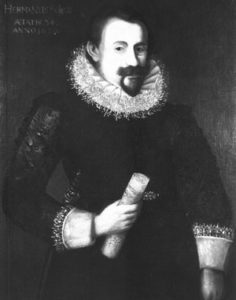Schein, Ach Herr, ach meiner schone
 In the past two weeks we have looked at the music of Heinrich Schütz and Samuel Scheidt. Johann Schein (1586-1630) represents the third member of our famous trio of early German Baroque composers.
In the past two weeks we have looked at the music of Heinrich Schütz and Samuel Scheidt. Johann Schein (1586-1630) represents the third member of our famous trio of early German Baroque composers.
Schein was born in Grünhain, but moved to Dresden after the death of his father in 1593. At the age of 13, he entered a school in Naumburg specializing in music and the humanities. My future list of composers who went off to university to study law will not be complete with Schein. But after four years at the University of Leipzig, he was appointed music director to Gottfried von Wolffersdorff in Weissenfels (the hometown of Schütz).
We also have to add Schein to the long list of significant artists who lived in my adopted city of Weimar—a list that includes Bach, Goethe, Schiller, and Liszt, among many others). Shortly after going to Weimar, however, he took the position of cantor at the Thomaskirche in Leipzig (where Bach would later spend his last 23 years). As with Bach, his duties extended to the nearby Nicolaikirche as well (scroll to the end of this article).
The work featured here comes from Israels Brünnlein (The Fountains of Israel), a 1623 collection of pieces with Old Testament texts. Schein expressed his intention to exhaust the possibilities of German word-painting in “the special, graceful style of the Italian madrigal.” It was Schütz, having studied in Italy, did the most to bring the early Baroque Italian style into German music, but Schein figures prominently in this development as well.
| Ach Herr, ach meiner schone, nach deim Grimm mir nicht ablohne. Denn deine Pfeil zumal machen mir große Qual. |
O Lord, O spare me, cast Your ire not upon me, For Your arrows cause me such great agony. |
| O weh, mein armes Herz empfindet großen Schmerz. O du mein lieber Herre Gott, hilf mir in meiner großen Not. |
O, my poor Heart is greatly afflicted. O my beloved Lord, help me in my great distress. |



